
French postcard by Humour à la Carte, Paris, no. ST-105. Photo: Pascal Dolemieux / VU.
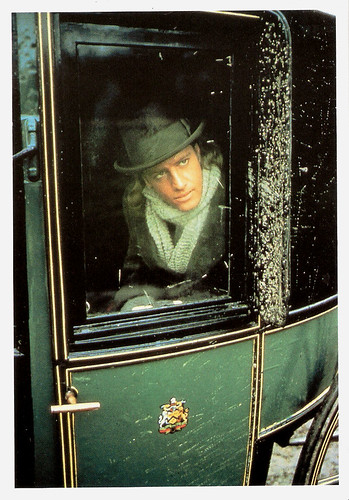
French postcard by Humour a la Carte, Paris, no. ST-148. Photo: Christophe Lambert in Greystoke: The Legend of Tarzan, Lord of the Apes (Hugh Hudson, 1984).
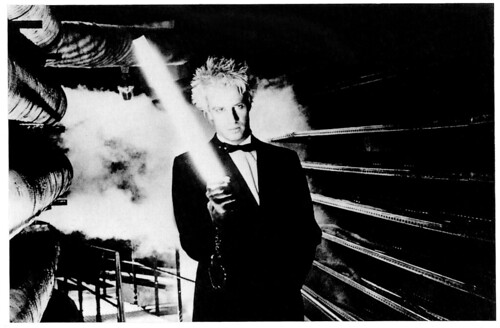
French postcard by World Postcards, 1989, no. X213. Christophe Lambert in Subway (Luc Besson, 1985).

Italian postcard, no. 2161. Christophe Lambert in Highlander (Russell Mulcahy, 1986).

French postcard in the Collection 9. 1/2 by Editions 'Humour à la Carte, Paris, no. ST-96. Photo: Xavier Lambours / VU.
Tarzan
Christophe Guy Denis Lambert was born in Great Neck, Long Island, New York in 1957. His mother was a French psychiatrist and his father was a French diplomat stationed in the US at the United Nations at the time of Lambert's birth. His family left the US when he was only two years old after his father was assigned by the UN to Switzerland.
Christophe was educated at private boarding schools in Geneva. At the age of 12, he appeared in a play. At 16, he moved to Paris. Lambert worked with the London Stock Exchange and served in the French military, both allegedly at his father's insistence. Then he studied at the Paris Conservatoire for two years. He made his film debut with a small role in the comedy Ciao, les mecs/Ciao, You Guys (Sergio Gobbi, 1979) with Charles Aznavour.
He soon appeared in more films, but did not become a star until he played the leading role in Warner Brothers’ lush epic Greystoke: The Legend of Tarzan, Lord of the Apes (Hugh Hudson, 1984). In this English-language film, he was credited as Christopher Lambert but in French-speaking countries, he would remain known as Christophe Lambert. His Greystoke co-stars included Andie MacDowell, Ian Holm, James Fox and Ralph Richardson in his final film performance. Tarzan buffs liked the film for remaining quite faithful to Edgar Rice Burroughs' original story. Looking as good in period costumes as he did in a scanty loincloth, Lambert also became the newest sex symbol in France.
That same year he also had his first lead role in a French film, opposite Catherine Deneuve in Paroles et musique/Love Songs (Élie Chouraqui, 1984). Then he played the male lead in the excellent thriller Subway (Luc Besson, 1985) opposite Isabelle Adjani, for which he was awarded a César Award for Best Actor.
The intense gaze he showed in these and many later roles is the result of myopia at an early age. Myopia is a condition that causes the eyes to focus incorrectly, making distant objects appear blurred. He cannot see without his glasses, and because he cannot wear contact lenses, he is often forced to act while virtually blind. This has led to injuries while performing his own stunts without glasses.
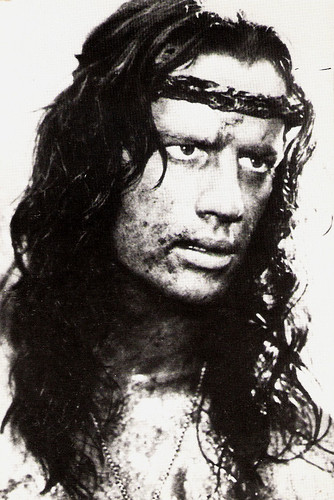
French postcard by Ebullations, no. 60. Photo: Christophe Lambert in Greystoke: The Legend of Tarzan, Lord of the Apes (Hugh Hudson, 1984).

French postcard in the Collection 9. 1/2 by Editions Humour à la Carte, Paris, no. ST-65. Photo: Christophe Lambert in Subway (Luc Besson, 1985).

French postcard by Editions Photomania, Paris, no. P 199. Photo: Elizabeth et Françoise Prouvost / Photomania.

French postcard by Editions Photomania, Paris, no. 214. Photo: Elizabeth and Françoise Prouvost / Photomania.

French postcard by Editions Humour al Carte, Paris, no. ST-72.

French postcard by Éditions Humour à la Carte, Paris, no. ST-104. Photo: Gérard Uferas / VU.
A sword-wielding Scotsman
In 1986, Christopher Lambert played his most famous role: the immortal Connor MacLeod, a sword-wielding Scotsman born in the Highlands of Scotland in 1518, who finds himself fighting evil in modern-day New York. Highlander (Russell Mulcahy, 1986), co-starring Sean Connery, was an international success.
However, upon initial US release, it was not well-received, but it gained wide and persistent popularity in Europe and on other markets, as well as on home video. It has since obtained status as a cult classic, leading to four sequels, a television series, and various other spin-offs.
Lambert appeared in the three sequels that were released in cinemas, Highlander II: The Quickening (1991, Russell Mulcahy), Highlander III: The Sorcerer (1994, Andrew Morahan) and Highlander: Endgame (Douglas Aarniokoski, 2000). He was not in the TV film Highlander: The Source (Brett Leonard, 2007) made for the Sci-Fi Channel – and had only a cameo appearance in the pilot of the 1992 television series.
His films after Highlander, such as I Love You (Marco Ferreri, 1986) and The Sicilian, (Michael Cimino, 1987), in which he starred as Salvatore Giuliano, were less successful than his previous pictures.
In To Kill a Priest (Agnieszka Holland, 1988), he played a character based on Jerzy Popiełuszko, the young Polish priest who spoke out against the Communist regime. The film was well-received by critics but was a financial failure.

French postcard in the Signes du Zodiaque series by Editions F. Nugeron, no. 7. Christophe Lambert in Greystoke (Hugh Hudson, 1984). Caption: Belier 21 Mars - 20 Avril (Belly 21 March - 20 April).
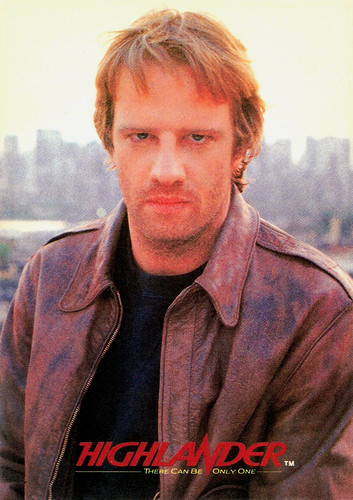
British postcard by Reflex Marketing LTD, Watford.
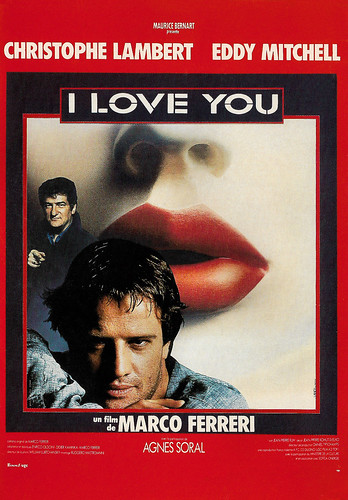
French postcard by Humour à la Carte, Paris, no. A-C 195. Image: Landi / SPADEM / UGC. Italian poster for I Love You (Marco Ferreri, 1986) with Christophe Lambert and Eddy Mitchell.

Picture of Italian calendar 'Forto grammi di set'. Photo: Gianni Caramanico. Christophe Lambert and Diane Lane in Love Dream (Charles Finch, 1988).

French postcard by Sonis, no. C 159. Photo: publicity still for Highlander II: The Quickening (Russell Mulcahy, 1991) with Virginia Madsen.

French postcard by Sonis, no. C. 160. Photo: Christophe Lambert and Sean Connery in Highlander II: The Quickening (Russell Mulcahy, 1991).
Direct-to-video
During the 1990s, Christopher Lambert starred in action and Science-Fiction films such as the thriller Knight Moves (Carl Schenkel, 1992) with Diane Lane, Fortress (Stuart Gordon, 1992), Gunmen (Deran Sarafian, 1993) with Mario Van Peebles, and the Italian-produced Nirvana (Gabriele Salvatores, 1997).
His filmography also included low-budget films such as Adrenalin: Fear the Rush (Albert Pyun, 1997), which were generally poorly received by critics and often enjoyed only direct-to-video releases.
In the course of that decade, Lambert also occasionally appeared in French films such as the thriller Max et Jérémie/Max & Jeremie (Claire Devers, 1992) with Philippe Noiret.
In 1995, he played the role of the thunder god Raiden in Mortal Kombat (Paul W.S. Anderson, 1995), a movie adaptation of the popular video game series. Lambert was interested in reprising his character in the sequel, Mortal Kombat: Annihilation (John R. Leonetti, 1997), but he was committed to his role in Beowulf (Graham Baker, 1999), and the role was given to James Remar.
Primarily an action star, Lambert occasionally showed up in other genres, including the romantic comedy Arlette (Claude Zidi, 1997) with Josiane Balasko. He also became active as a film producer and has produced French films such as the drama N'oublie pas que tu vas mourir/Don't Forget You're Going to Die (Xavier Beauvois, 1995) and the gangster film J'irai au paradis car l'enfer est ici/I will go to heaven for hell is here (Xavier Durringer, 1997).

British postcard by Minerva / Holmes McDougall LTD, Edinburgh, no. 275, 1987.

French postcard by Editions Rock RV, no. CA 19.

French postcard by Ébullitions, no. 501. Christophe Lambert and Richard Anconina in Hercule & Sherlock (Jeannot Szwarc, 1996).

French postcard by Ébullitions, no. 612.

French postcard in the Collection Cinéma by Studio Magazine / Photomania, Paris, no. PSM 401. Photo: Luc Roux.
It's not over
In 2001, Christophe Lambert played the lead role of Gallic chieftain Vercingetorix in the France-Canada production Vercingétorix/Druids (Jacques Dorfmann, 2001), which was a critical and financial failure. In 2009, he was a lead in White Material (Claire Denis, 2009) opposite Isabelle Huppert. Now, both the film and Lambert's performance received critical acclaim.
In the last decade, he could be seen in the Bulgarian romantic comedy The Foreigner (Niki Iliev, 2012) and in the Marvel Comics film Ghost Rider: Spirit of Vengeance (Mark Neveldine, Brian Taylor, 2012) featuring Nicholas Cage. Reportedly, Lambert underwent sword training for 3 months and shaved his head for his role as Methodius. He co-starred in the French romantic comedy Un plus une (Claude Lelouch, 2015), the comedy Hail, Caesar! (Joel and Ethan Coen, 2016) and in the star-studded comedy Chacun sa vie et son intime conviction (Claude Lelouch, 2017). He remained active in the action genre with the thriller The Broken Key (Louis Nero, 2017) with Rutger Hauer and Michael Madsen and the martial arts film Kickboxer: Retaliation (Dimitri Logothetis, 2018).
Lambert received high praise for his role as SS officer Karl Frenzel in the Russian film Sobibor (Konstantin Khabensky, 2018) about the only successful uprising in a Nazi death camp. Lambert was part of the ensemble cast of Bel Canto (Paul Weitz, 2018). He played the French ambassador who was part of the Japanese embassy hostage crisis (also called the Lima Crisis) of 1996–1997 in Lima, Peru. His latest film is the horror thriller It's not over (Alessandro Riccardi, 2022).
Lambert was married twice. He met his first wife, American film actress Diane Lane in 1985 when they were both in Rome on separate publicity junkets. They married three years later and had one daughter, Eleanor Lambert (1993). They divorced in 1994. In 1996 he married Jaimyse Haft. They divorced in 2006. He later had a relationship with actress Sophie Marceau with whom he appeared in the crime drama La disparue de Deauville/Trivial (Sophie Marceau, 2007).
In a 2010 interview with the British newspaper The Guardian, he stated that he lives mostly on an aeroplane and he can't stay anywhere longer than a few months. Along with owning a mineral water business and food processing plant, Lambert produces Côtes-du-Rhône wines with partner Eric Beaumard at a vineyard located in Sainte-Cécile-les-Vignes, France. When not on location, he divides his time between his winery, his ‘main residence’ in Switzerland, and his daughter in Los Angeles.

French postcard in the 'série acteurs' by Les Editions GIL, no. 6.

French postcard by Post Card Collection, no. 320.

Vintage postcard.

French postcard, no. 1111.
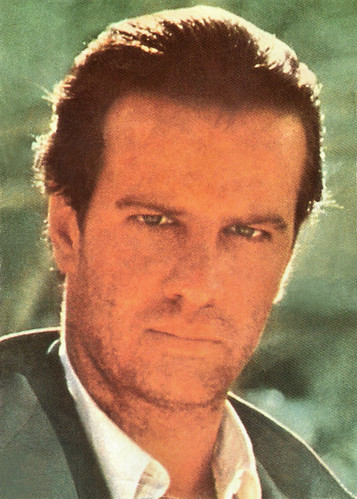
Romanian postcard by Collectia Cinefilului Acin.
Trailer for White Material (2009). Source: MovieManiacs (YouTube).
Sources: Ed Stephan (IMDb), Lizzy Davies (The Guardian), Sandra Brennan (AllMovie), Wikipedia and IMDb.
He was great in Of Gods and Men
ReplyDelete